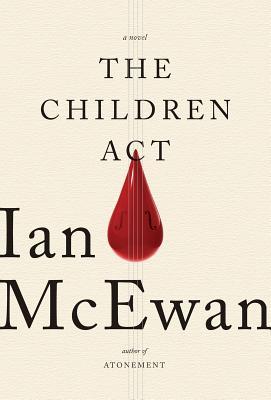McEwan offers a challenging legal drama

ROME - ‘Expect the unexpected’ is the watchword with any Ian McEwan novel, suspense will be a given, and the odd stunning reversal.
In The Children Act, the professional is a 59-year-old High Court judge in London, Fiona Maye. She is entirely credible as we watch her at work in her chambers, in court and in her nearby flat assigned to her on her appointment. She is as married to the law as some women ‘became brides of Christ’. Unlike them, however, she has a flesh-and-blood husband she takes for granted after thirty-five years of marriage. She has no children.
The novel opens with the Judge polishing for publication her judgement on the case of an Orthodox Jew who opposes his divorced Jewish wife’s decision to send their daughters to a coeducational school which will wean them from narrow traditions. No prizes for guessing who wins.
Fiona has made a brilliant career and has cultured tastes in music and literature but is not doing as well as she thinks on the domestic front. She and Jack, a university professor of ancient history, are a ‘mini institution’ but he feels the élan has gone out of the marriage. He tells her he intends to have a last shot at ‘sexual ecstasy’ with a 28-year-old statistician, while adding that he ‘still loves’ Fiona. When she rejects his open marriage proposal he walks out, leaving her ‘in the infancy of old age, learning to crawl’. This shock coincides with an emergency case: a boy, Adam, faces death from leukemia unless she overrules his Jehovah’s Witness parents who, because it is a tenet of their faith, oppose the necessary blood transfusion. The boy is within three months of his eighteenth birthday, when he can decide for himself but for now, obedient to his parents’ beliefs, he is willing to die. She has to give her verdict within three days or he will suffer severe brain or kidney damage at least, if not death.
This is not just another knotty problem, because this time the Judge abandons ‘God-like distance’ to become personally involved. She decides to visit the boy in hospital. This results in the best scene in the book as intelligent Adam provokes the Judge, shows her his poetry and plays the violin for her, evoking a response far beyond her formal role. The Press is agog at her ruling but this reader was unsurprised when she decides for the hospital (and the child) against the parents and their religion, decreeing that Adam must have the transfusion, and saves him.
This is far from the end of the story. When Adam regains his health and returns to school, he writes repeatedly to her because he considers her ‘the antidote against the poison of his parents’ religion.’ She has taken responsibility for keeping him alive. She has saved him. He even follows her when she goes to Newcastle to sit on other cases. On a traditionally dark and stormy night, he arrives there sopping wet at a dinner she is at with other dignitaries. She leaves them to find out what he wants, which is life guidance: he hopes he can move in with her. He has no conscious sexual aim; nor has she, but she gives him a fleeting kiss before sending him away to one of his relatives. Adam is somewhere between the child she has never had and, potentially, a lover who could balance Jack’s.
However, she regrets her impulsive kiss and, on return to London, tries to mend her stale marriage to Jack, who has returned chastened from his brief fling with the 28-year-old. What then happens to Adam is the twist at the end of the story, which for my mind involves inconsistencies regarding both himself and his parents. In the Guardian of 5 September, McEwan explains that the twists are based on an actual case, but they need more development in fiction to seem plausible.
The Children Act 1989 asserts that the interest of the child is paramount over that of the parents but is neutral about religious issues. However, the novel The Children Act, to a certain extent, seems contrived to show that religion taken seriously wrecks lives. Here religion is linked to a series of easy targets. The stage machinery creaks.
One of the judge’s final thoughts is that Adam came to find her, ‘wanting what everyone wanted, and what only free-thinking people, not the supernatural, could give. Meaning.’
This seems like a circular statement, because ‘free-thinking’ here is synonymous with ‘right thinking.’ However, the Judge’s words may not be the author’s declaration but a reflection which adds depth to her portrayal: that she had failed Adam because she had not provided with continuity that mixture of free thinking, good taste and appreciation of the arts which was all she had to offer. Instead she kept to her path, avoiding risks and guarding her reputation when she rejected his request to take him in.
McEwan is meticulous in presenting the legal cases but there is some tiresome repetition when in court scenes he repeats issues he has already explained and he can be preachy, as in a passage about ecology. This spare novel is thought-provoking because it is relevant to issues such as abortion and euthanasia and even to fanatical terrorism, but it is limited by the feeling that McEwan is working to a brief.
“The Children Act”, by Ian McEwan, published by Jonathan Cape, 224 pages, £16.99


